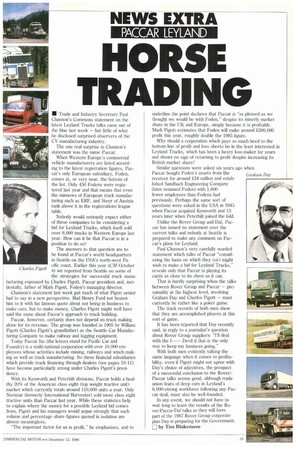HORSE TRADING
Page 47

If you've noticed an error in this article please click here to report it so we can fix it.
• Trade and Industry Secretary Paul Channon's Commons statement on the latest Leyland Trucks talks came out of the blue last week — but little of what he disclosed surprised observers of the CV manufacturing industry.
The one real surprise in Channon's statement was the name Paccar.
When Western Europe's commercial vehicle manufacturers are listed according to the latest registration figures, Paccar's only European subsidiary, Foden, comes at, or very near, the bottom of the list. Only 450 Fodens were registered last year and that means that even the minnows of European truck manufacturing such as ERF, and Steyr of Austria rank above it in the registrations league table.
Nobody would seriously expect either of these companies to be considering a bid for Leyland Trucks, which itself sold over 9,000 trucks in Western Europe last year. How can it be that Paccar is in a position to do so?
Charles Pigott The answers to that question are to be found at Paccar's world headquarters in Seattle on the USA's north-west Pacific coast. Earlier this year (CM October 4) we reported from Seattle on some of the strategies for successful truck manufacturing espoused by Charles Pigott, Paccar president and, incidentally, father of Mark Pigott, Foden's managing director.
Channon's statement last week put much of what Pigott senior had to say in a new perspective. Had Henry Ford not beaten him to it with his famous quote about not being in business to make cars, but to make money, Charles Pigott might well have said the same about Paccar's approach to truck building.
Paccar, however, certainly does not depend on truck making alone for its revenue. The group was founded in 1905 by William Pigott (Charles Pigott's grandfather) as the Seattle Car Manufacturing Company to make railway and logging equipment.
Today Paccar Inc (the letters stand for Pacific Car and Foundry) is a multi-national corporation with over 10,000 employees whose activities include mining, railways and winch-making as well as truck manufacturing. Its three financial subsidiaries which provide truck financing through dealers (see pages 10-11) have become particularly strong under Charles Pigott's presidency.
With its Kenworth and Peterbilt divisions, Paccar holds a healthy 20% of the American class eight (top weight tractive unit) market which currently totals around 110,000 units a year. Only Navistar (formerly International Harvester) sold more class eight tractive units than Paccar last year. While these statistics help to explain where the money for a possible Leyland bid comes from, Pigott and his managers would argue strongly that such volume and percentage share figures quoted in isolation are almost meaningless.
"The important factor for us is profit," he emphasises, and to underline the point declares that Paccar is "as pleased as we thought we would be with Foden," despite its miserly market share in the UK and Europe, simply because it is profitable. Mark Pigott estimates that Foden will make around £300,000 profit this year, roughly double the 1985 figure.
Why should a corporation which pays Sc) much heed to the bottom line of profit and loss sheets be in the least interested in Leyland Trucks, which has been a heavy loss-maker for years and shows no sign of returning to profit despite increasing its British market share?
Similar questions were asked six years ago when Paccar bought Foden's assets from the Graham Day receiver for around 218 million and established Sandbach Engineering Company (later renamed Foden) with 1,600 fewer employees than Fodens had previously. Perhaps the same sort of questions were asked in the USA in 1945 when Paccar acquired Kenworth and 13 years later when Peterbilt joined the fold.
Unlike the Rover Group and Daf, Paccar has issued no statement over the current talks and nobody at Seattle is prepared to make any comment on Paccar's plans for Leyland.
Paul Channon's very carefully worded statement which talks of Paccar "considering the basis on which they (sic) might wish to make a bid for Leyland Trucks," reveals only that Paccar is playing its cards as close to its chest as it can.
That is hardly surprising when the talks between Rover Group and Paccar — presumably at the highest level, involving Graham Day and Charles Pigott — must currently be rather like a poker game.
The track records of both men show that they are accomplished players at this sort of game.
It has been reported that Day recently said, in reply to a journalist's question about Rover Group suppliers: "I'll deal with the f Devil if that is the only way to keep my business going."
With both men evidently talking the same language when it comes to profitability, even if Pigott might not agree with Day's choice of adjectives, the prospect of a successful conclusion to the Rover/Paccar talks seems good, although trade union fears of deep cuts in Leyland's 6,000-strong workforce following any Paccar deal, must also be well-founded.
In any event, we should not have to wait long to learn the results of the RoveriPaccarDaf talks as they will form part of the 1987 Rover Group corporate plan Day is preparing for the Government. II] by Tim Blakemore












































































